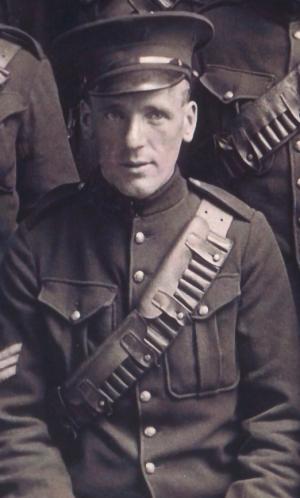BC September 13, 1916
Letter from Sergeant William Beach of 84th – The Battalion Has Been Drafted, the Majority Going to the 75th
In confirmation of the many reports which have from time to time reached Brantford that the 84th Battalion no longer existed as a unit, is the following letter sent by Sergeant William Beach, of this city, who went overseas with the 84th and is now at the front, to Mr. Ira D. Scruton, secretary of Court Success, A.O.F. The letter which contains much news of local interest reads:
No. 164014
D. Coy, Canadians
Somewhere in France,
c.a. Army Post Office,
London, England
Dear Ira,
Just a line to let you know that I have not forgotten you, I intended to write to you before but we have been moving around a great deal since we left Canada. I do not know whether you have heard about it or not, but the 84th Battalion, half of whom were stationed in Brantford, were nearly all transferred into the 75th Battalion, stationed at Bramshott Camp, England, so if you are interested in any of the boys who were in Brantford last winter you will have to look in the 75th Battalion records from Toronto.
Well, after a short stay in England we were shipped over to Belgium, and after a few weeks training were eventually sent to the firing line.
We have been in the trenches for three days, and considering the heavy bombardment that Germs gave us on the 24th, the “Clown Prince’s” birthday, I think, our casualties have been very slight.
We are now resting in a barn about a mile in the rear of the firing line, and it is really worse here than it is in the front line trenches. Here we have four enemies to contend with: Rats, bed comforters and mosquitoes. So you see we have lots of company. I think that the Germans are the easiest to contend with. They are like our bed mates. We scarcely ever see them. But they give us a lot of trouble. Well, we have another day to sleep and scratch and then we will be going back to the trenches, so we will be kept pretty busy dodging their “rum jars” and “sausages” – two German fancy shells – for awhile. Before closing, I must mention the Belgians and their country.
The Belgians are a very hard working race, and I was surprised to see their country, practically every inch of what they have left, is under cultivation. It is just great to see what splendid crops they have.
One thing that I noticed more than anything else was that most of the work in the fields is done by hand, not by machinery, the same as it is done in Canada. And it is a treat to watch both men and women cutting their crops with the scythes and binding by hand.
Well, how are you getting on in Brantford? I hear that the 125th are in Borden Camp, England, also that the 215th are going to Borden Camp, Ontario. If that is so Brantford will be a very quiet place to what it was a little while ago. But it may not be for long, because the old hands out here think that the war will not last much longer, and if that is the case we will all be back to our old homes very soon. And what little bit I have seen of it myself causes me to think the same. But I do not want to come back until I have seen a little more of it. It’s a place where a man has to be very careful and then it is practically safe.
For our first experience we were placed under a number of French Canadians and they are fine fellows. Although we new fellows were a bit nervous at first when we were under German fire, it did not take those men long to convince us that it was a great sport. They know the different sound of every German shell that is fired in our direction, and they can nearly tell you when and where they are going to explode. So with a little more experience, the boys from Brantford and Toronto will be as nervy as the rest of the boys out here.
Well, old pal, I will have to close for this time, because it is getting very noisy. Our friends the gunners have just started to give Fritz his supper.
Yours respectfully,
Wm. Beach

